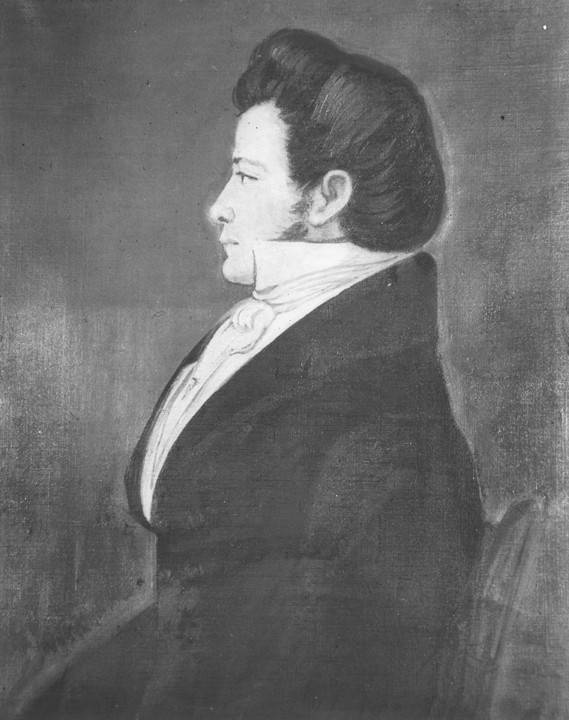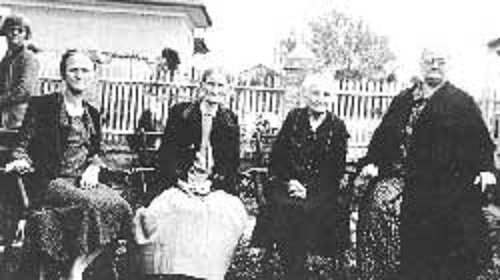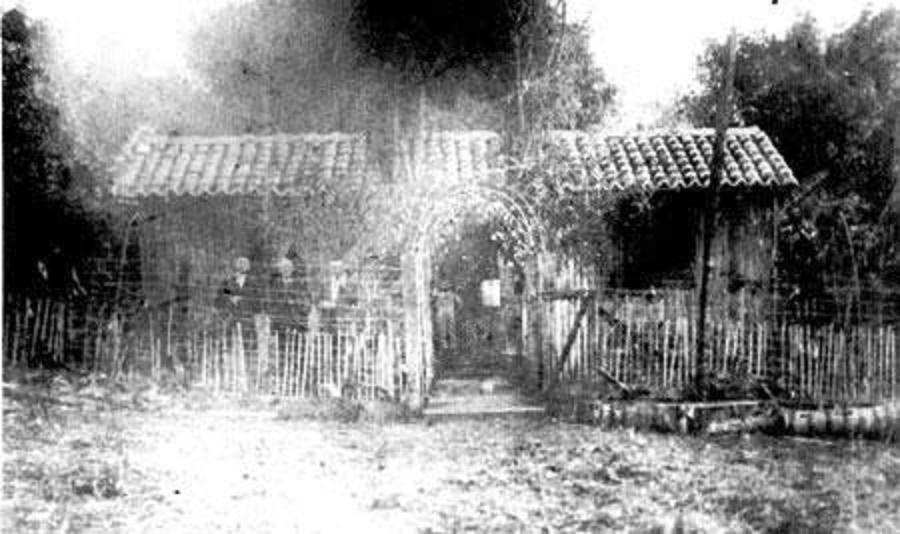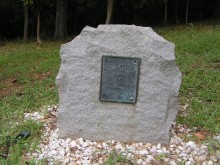(After the Civil War, many residents of the south were faced with bankruptcy after losing most of the land and property in the war and some even faced imprisonment. Brazil offered the opportunity for them to start over in Brazil. The following includes many names of the immigrants to Brazil from Alabama and other southern states.)
“In 1865 at the end of the American Civil War a substantial number of Southerners left the South; many moved to other parts of the United States, such as the American West, but a few left the country entirely. The most popular country of Southerners emigration was Brazil.”
Southern Migration to Brazil
“Whether or not the political unrest incident to the changed conditions following the surrender of the Confederate Armies in the spring of 1865, prompted the consideration of a large number of former leaders in the South to emigrate to Brazil, is not yet established. Economic conditions, no doubt played a large part in the arrival at a determination to go to this foreign country.
Lost much of their property
Many of the men who went had (formerly served in the Confederate Army, and had lost much of their property through the results of the War. They had accumulated their fortunes through that business popularly known as “planting”, and they sought to begin life anew. For the most part they were men of families, and their surviving descendants, at least, credit them with feeling that they wished to re-establish themselves on the social scale which had so characteristically surrounded them in the South Atlantic and Gulf States.
“Do you need some help in your genealogy search? Save time and avoid pitfalls in your research with this inexpensive book.“
The Southern Colonization Society, with headquarters at Edgefield Court House, South Carolina, Major Joseph Abney, late Colonel of the 22nd September, 1865. Major Robert Meriwether and Dr. H. A. Shaw were sent to the Empire of Brazil by this organization. They left Augusta, Georgia, on the 18th of October.
Men took a trip to survey Brazil
They secured passports at Washington City and took passage on the “North America” a steamer of the United States and Brazil Line. Leaving New York City on October 30th, they arrived at Rio de Janeiro November 26th. Their report states that they met several gentlemen from the South who had been in Brazil several months on the same mission, notably, to examine conditions and report as to climate, productions, laws, religion, etc.
Dr. J. McF. Gaston of South Carolina, had prior to that time, made an extensive tour into the interior of San Paulo. About the end of the year 1865, two Texans, Frank M. Mullen and William Bowen, visited Brazil. They made an extensive survey and their report is dated Rio de Janeiro, May 24, 1866. The Rev. Ballard S. Dunn of Louisiana was in Brazil on the 9th of November, 1865 on a similar mission.
Two men already purchased land in Brazil
Major Meriwether’s report makes the characteristic reference that at the date of his visit: “Two gentlemen from the States, one from Alabama and the other from Louisiana, have already purchased and settled here.” It will subsequently develop that the two men referred to were Charles Gunter of Montgomery and Reverend Dunn of New Orleans. However, it is established that while they may have purchased and were considered as established, they had not at the time removed there. No date is given, but it would seem that this was prior to the 1st of January, 1866.
“Did you know that religious persecution occurred in early America? Read about it in this historical series by Alabama author Donna R. Causey“
Enthusiastic response from Brazilians
A statement sent from Rio de Janeiro and entitled “History of Southern Immigration to Brazil” about the latter part of January, 1866, says: “Before the War large numbers of southern planters and efficient artisans premeditated a pioneer visit to Brazil. Collapse of Confederate States intensified this feeling, elicited much correspondence and associations for emigration formed in many communities. Associations put their fortunes in the hand of General William Wallace Wood of Mississippi. Enthusiastic receptions in Rio de Janeiro, music, church bells and crowds in streets, Dixie played for Wood, and special privileges given, land offered at 22cts an acre.”
Steady emigration of southern families followed
Lansford W. Hastings published in Mobile, in the spring of 1867, an Emigrant’s Guide to Brazil.”Mr. Hastings was a California pioneer, a member of the Constitutional Convention of that State in 1849, and is said to have served in the Confederate Army. It is claimed that he had made two trips to Brazil and had secured a large grant of land, and died either on board ship or soon after its arrival at Para.
The Rev. Dunn published “A Practical Account of What the Author and Others who Visited that Country for the same Object, saw and did while m that Empire.” He called it “Brazil, the Home for Southerners.” It is known that he resided in Sao Paulo in 1869, though how much later cannot be said. Major Robert Meriwether who went out in 1865, was residing in the Empire many years later.
The flattering reports of these advance agents doubtless had much to do with the large and steady emigration of southern families to Brazil over the period extending to 1871 and 72. However, it is known that as late as the year 1890 families were still settling in Brazil “from the States.”
General Wade Hampton wanted them to wait
That there was no universal determination to go is evinced by the attitude of such men as General Wade Hampton of South Carolina, who advised “his late companions in arms to tarry a season and endeavor to right up the State and improve the conditions here before they abandon the lands and scanty possessions, and seek for new homes under brighter skies and serener heavens of the far South.”
“Did you know that religious persecution occurred in early America? Read about it in this historical series by Alabama author Donna R. Causey“
Although conditions in Alabama were equally as deplorable (so far as the corruption of politics was concerned) as those in South Carolina, there were many in Montgomery who counseled against this move. To offset this many men of the temperament of Colonel Charles Gunter who were classed as “irreconcilables” insisted on going to Brazil.
 Col. Charles Gunter served in the Alabama House of Representatives from 1847 to 1850. After the Civil War, he moved to Brazil, bought slaves, and had a plantation.
Col. Charles Gunter served in the Alabama House of Representatives from 1847 to 1850. After the Civil War, he moved to Brazil, bought slaves, and had a plantation.
“The writer is not convinced that the statement sent out from Rio de Janeiro in 1866 that “before the War large numbers of southern planters and efficient artisans premeditated a pioneer visit to Brazil is true. Certainly not for the purpose of residing in Brazil was there any “large number of southern planters” anticipating this move.
Social conditions were too roseate up to 1860 to have caused such thoughts. It is true that political conditions were beginning to agitate the minds of the leaders in the cities, but the southern planter was not a city dweller. The emancipation of slaves and the inability of men of means to secure labor to carry forward their plans, was without doubt, the fomenting cause for such widespread preparation to move, after the reports of these emigrant agents.”
 Eliza Adams Gunter, wife of Charles G. Gunter – ca. 1858 – According to notes written on the back of the photograph, Eliza Gunter was born May 4, 1816, and died October 10, 1860, she had auburn hair and blue eyes. The notes also say that this carte-de-viste was copied from an older photograph. Q11694
Eliza Adams Gunter, wife of Charles G. Gunter – ca. 1858 – According to notes written on the back of the photograph, Eliza Gunter was born May 4, 1816, and died October 10, 1860, she had auburn hair and blue eyes. The notes also say that this carte-de-viste was copied from an older photograph. Q11694
Government of Brazil encouraged immigration
The government of Brazil appears to have immediately grasped the opportunity and to have encouraged in every possible manner, the bringing of foreigners to their country. Under a “Favors to Emigrants” statement is:
“The Government will sell lands in any of its colonies or in the localities that the Emigrants prefer; and will give them gratuitous transports from Rio de Janeiro to the seaport to which they wish to proceed.
On the choice of the lands and the respective measurements being made, the definite title-deeds to the property shall be delivered to them upon payment of the price of the sale of 1 or 2 Reis each square braca (52.5 feet English)
 Early American family in Brazil (Wikipedia)
Early American family in Brazil (Wikipedia)
The owners of the lands purchased from the States are subject to the following onus. 1st, To cede the lands necessary for roads 2nd, To give free transit to their neighbors to the public road, town or port of embarkation. 3rd, To allow the taking away of unneeded water. 4th, To subject the discovery of any mines to the legislation governing the case “
House of first Confederate family in Americana, Brazil – Casa dos Norris House – Note:This may be Robert Norris’ house mentioned above (Wikipedia)
(To be continued)
SOURCES
- Excerpts come from the article written by Peter A. Brannon in The Alabama Historical Quarterly Summer -1930) “Embodying the Diary of Jennie R. KeyesMontgomery, Alabama. This study was made at the request of Dr. Wyatt H. Blake a zealous member of theBoard of Trustees of the Alabama State Department of Archives and History since its creation in 1901.
- Wikipedia
“Read more about these immigrants in The Confederados: Old South Immigrants in Brazil “
“





Interesting
I ran across this list many years ago, and can’t for the life of me remember how I got to it. Unfortunately all of my written down research has been lost. I believe I found one of my ancestors on the list. If I am not mistaken, it was a ship manifest I had found. Dang old age and memory loss.
Every Southern should read this.
My 3rd. great-uncle, Brig. Gen. A.T. Hawthorn, moved to Brazil after the war for almost 10 years, but he came back. He was born in Conecuh Co.., Alabama.
Wow that’s why I can’t find much on the Hawthorn family.My children have that name in their fathers family Their GGrandma was Isabell called her Isa.I think he was Thomas E T Hawthorn Tallapoosa Co Al
They are a different family from mine. All mine were in southern Alabama. They came from Georgia in 1817. I’ve seen your Hawthorn’s a lot in census records up north from mine.
I saw a pic of Thomas grave and the request for his headstone love tracing roots.As Forest said you never know what you gonna get Lol have a good day.
Got a Ruth Hawthorn in either of those, born in the mid to late 30’s….?
The only Ruth Hawthorne I have was born 1902 in Greenville, AL. Then moved to Houston in 1910.
Not sure I know Mary Hawthorne married George Easterwood Tallapoosa Co Al They lived in another County but cannot recall which one
Fascinating story!
a lot of my family moved to brazil we have some of the letters that they wrote home (scurlock)
I never new this!
About 20 or so years ago, Janet Hall of Fox6 News in Birmingham went to Brazil and interviewed some descendents of the Confederados. A copy of that report might be available for purchase from their archives.
Good riddance.
So you think people from the south are “southern american idiots”
That would include me, so I’ll just say some of them/us are.
Interesting.
Why no mention of Col. William H. Norris from Monroe County Alabama?
He was the first to immigrate and the founder of the Conferados in Brazil,
Yes. There are three more parts to this story that you will see on Alabama Pioneers in the coming days and Col. Norris will be in the stories. I had to break this story up because it was so long. There is a picture of the Norris house at the bottom of this page in this story.
My Great, Great Grandfather was Lieutenant John Washington Keyes, from Athens, AL. I learned from another study that he entered the Confederate Army as a member of a Cavalry Company under Captain, later General, James H. Clanton. He was subsequently a 2nd Lieutenant of Company E, 1st Battalion, Hilliard’s Legion and later became a 2nd Lieutenant of Company F of the 60th Alabama Infantry Regiment. He was subsequently Surgeon of the 17th Infantry Regiment. In 1867 the family moved to Brazil. His daughter Alice Keyes Scott, kept a diary of her time in Brazil. My family members have a copy if you would like to review it.
I may have missed something, is there a list of the families?
Thanks
Shirley
Those confederates lost the war so they lost their “property” and they moved to Brazil to make more dirty money since slavery wasn’t abolished there until 1888.
Why don’t you look into the ZULU Nation when you start blaming somebody for slavery! Bottom line is slavery as you know it started with the ZULUS!!! When they conquered your tribe they either killed you or enslaved you for work!!! They sold you to European traders and it progresses from there and they had slavery in the Northern states for years and years before the southern states got them!!!
If any of your ancestors did horrible things, would you still want to know who they were and where they went?
This Confederate thing would never fly in the USA today. Such a shame. A very interesting story.
Intersting I’ve lived in Alabama all my life but never heard this.
My mother told me about this when I was a child! Few people know or believe it, but she knew it was true. Thanks for publishing this article!!
Very interesting….
One branch of the Steagall family (not mine) moved to Brazil. I found several articles on them back in the 70s. Haven’t researched since then but may now that I saw this post.
My great-great grandparents (Smith side of the family) took their family to Brazil. We have relatives born there, some stayed there, and some died and are buried there.
Are you by any chance related to Don Pedro Smith of Choctaw County, Alabama? My mother grew up knowing him as Uncle Ped, and said he was born in Brazil!
I read about this year’s ago, very interesting.
I remember studying in History class about the Confederates who went to Brazil. According to what I remember, the first people who went there did so because they refused to take an oath to the United State, which all Confederates were required to do after the War Between the States (also known as the War of Northern Aggression). I assume this is another fact that is left out of the history books now. It is so sad to see our history completely distorted or omitted entirely. I do not know whether any of my ancestors went to Brazil, but one of the earlier comments was by someone who had family in Conecuh County. That is also where the Floyd family lived, although my branch moved to Texas after the war. my 3rd great-grandfather, Jordan Floyd, was killed by run-away slaves, about 1825.
The Brazilian descendants of these Confederates celebrate their rebel heritage even today. Saw it on tv once it’s an annual thing for them……antebellum dresses, flags and all. Very interesting.
The Brazilian descendants of these Confederates celebrate their rebel heritage even today. Saw it on tv once it’s an annual thing for them……antebellum dresses, flags and all. Very interesting.
Awesome story. Loved it.
Thanks for the post, some Scurlock’s from Choctaw County Joined this move and did stay in Brazil.
Yes it was a shame that many of the families like mine with 14 Rev War veterans lost their land that they had paid the price for. They fought for it twice, I guess you could say.
I remember a pretty good book on this from late last century. Maybe it was Los Confederados. Might still be in print.
Yes, I have a link to the book at the end of the article.
The Lost Colony of the Confederacy by Harter, Univ of Mississippi press.
Stu Tant, this is pretty interesting, I read article, I wonder if any of our ancestors went there?
Not sure Janet, I haven’t heard any of our kin mention anything about this.
My great great great grandfather, Daniel Rast, and his son, my great great grandfather Horace, briefly went to Brazil from the family home in Lowndes County after the Civil War, but as it states in the book, Collirene: The Queen Hill, “finding that Brazil was quite as thoroughly integrated as Alabama, they retraced their route and returned to Collirene.”
Hi, I’m a rast, supposedly related to Daniel rast, just curious about some of the rast history
[…] (Continued from Brazil I) […]
Too bad there were not teabagger conservatives there to tell the immigrants to go home.
In August 1865 my relative, Robert Levi Brown, from Sumter County, Alabama went on an exploratory expedition to Brazil with the group organized by William Wallace Wood from Mississippi. By June 1866 he was preparing to relocate, but died after a fall from a horse. His sons moved “out west” and were lost track of. His widow Amazon Parker remarried John P. May and removed to Texas. I have found other distant relatives who were living in Louisiana or Texas who moved, at least for a short while, to Belize to escape the uncertainty of reconstruction.
Anthony Figueiredo Allan N Bitelli
Nair Loney
Interesting read
I know my great grandfather was killed in the Civil War, he was Conscripted ( drafted), most men were made to fight, not their choice.
I saw a documentation on film of the True Southerners in Brazil. It’s like stepping back into time. They still have the deep South Southern drawl when they talk, still use Southern genteel ways and Southern mannerisms as if they were born & raised in Alabama, Missip, Tennessee, Georgia. South Carolina & Etc. It’s amazing to see from over 150 years of time that the South was well preserved in Brazil??? When they were filming inside of one of their homes I immediately saw the camera focus on a wall hanging made of cloth with a pictorial map on it such as cotton fields in Marengo County with the name of Demopolis, Alabama stitched on the cloth design. I’ve lived in Demopolis for almost 25 years and I had never seen that cloth design of a pictorial map. 20/20 or somebody also did a report of this on TV a few years back and it was very interesting!
I didn’t see their flag at the Olympics. Now that would have been interesting.
Los Confederados.
Judy Williams Norton Baker
Yes.
Many of Hitler’s regime also escaped to South America.
When you loss everything it is best to start over. For your information the family’s from Brazil are proud people .
I didn’t say they weren’t. I just made a statement. I come from a Confederate family, but they stayed and started over.
So interesting
Yes.
Who knew?
There’s a village in Brazil that celebrates Jeff Davis every year with confederate flags and honors their descendants from Alabama, with surnames like Barnett…etc.
My ancestors stayed. Some died in the CW. Survivors lost their land and became sharecroppers.
Chester’s great uncle was one of them that went.
Teresa Gunter Burke, any of these our relatives?
Hmm, losing their slave property?? good move.
I live in the confederate village here in Brazil and they were the main responsible for the evangelization of Brazil from Catholics to Evangelicals. We are already 32% of the population of Evangelicals in Brazil. and the name of the county that they installed themselves is Santa Bárbara d’ Oeste. it’s an Americana city